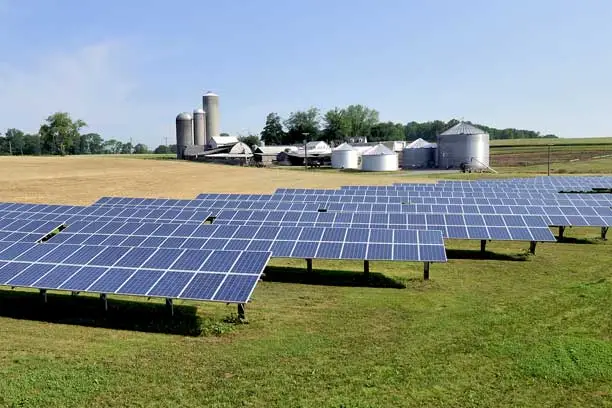Is Solar Power Right for Your Farm? Pros and Cons of Going Solar


As energy costs rise and sustainability becomes a growing priority, many farmers are exploring the benefits of installing solar panels for farm operations. Solar energy offers a promising way to reduce long-term expenses, increase energy independence and even generate new income. But is it the right investment for your farm?
Let’s explore the pros and cons of solar power for agriculture to help you make an informed decision.
Solar power offers numerous benefits for agriculture, making it a sustainable and cost-effective energy solution for farmers. By harnessing sunlight, solar panels can power irrigation systems, greenhouses and farm equipment, potentially lowering energy costs. Solar power for agriculture also supports off-grid farming operations, especially in remote areas with limited access to electricity. Here are a few more benefits of solar power.
Farms often rely on electricity-intensive systems like irrigation systems, refrigeration units, ventilation fans and automated feeding equipment. These systems can drive up monthly utility bills — especially during peak seasons.
Installing solar for farmers allows you to generate electricity on-site, reducing or even eliminating your reliance on the grid. Over time, this can cut energy costs and provide more predictable monthly expenses.
One of the biggest incentives for going solar is the availability of tax credits and rebates. Federal programs like the Investment Tax Credit (ITC) allow farm owners to deduct a significant percentage of installation costs from their taxes. Many states also offer clean energy grants or tax credits for farmers, making solar more affordable than ever.
In some states, farms with solar energy systems can sell excess electricity back to the grid through net metering programs. This can create a new revenue stream — especially during sunny months when production exceeds usage.
To qualify, farmers need to consider whether their system is on-grid or off-grid, obtain the proper permits, and ensure they have the right insurance coverage for their solar setup.
While solar energy offers many benefits, it also has some disadvantages for farms. One major drawback is the high initial cost of installation, which can be a significant financial burden for small or mid-sized farms. Additionally, solar panels require a large amount of space, potentially reducing the land available for crops or livestock. Their efficiency can also be affected by weather conditions, meaning energy production may be inconsistent during cloudy days or in regions with less sunlight. Here's more details about potential disadvantages of solar energy on your farm.
While solar can save money in the long run, the initial cost can be steep. On average, installing a solar system can cost between $15,000 and $30,000 or more, depending on the size and complexity of the system.
Factors like your farm’s monthly energy usage, the size of your property and local cloud coverage will influence how many panels you need — and how quickly you’ll see a return on investment.
If your barns or outbuildings can’t support a roof-mounted system, you may need to install ground-mounted solar arrays. These systems can take up valuable land that might otherwise be used for crops or livestock, so it’s important to weigh the trade-offs.
Some farmers worry about how solar panels might affect nearby growing crops. Panels can cast shade, alter water runoff or change soil temperature. However, solutions like planting shade-tolerant crops or using elevated mounts with more clearance can help minimize these impacts.
Before making the leap, ask yourself:
Whether you’re looking to reduce costs, increase sustainability or create a new income stream, solar power for agriculture offers exciting possibilities. But like any major investment, it’s important to weigh the pros and cons carefully.
At Farm Bureau Financial Services, we’re here to help you protect your farm — and your future. Talk to one of our agents today to learn how solar fits into your long-term risk management and insurance strategy.